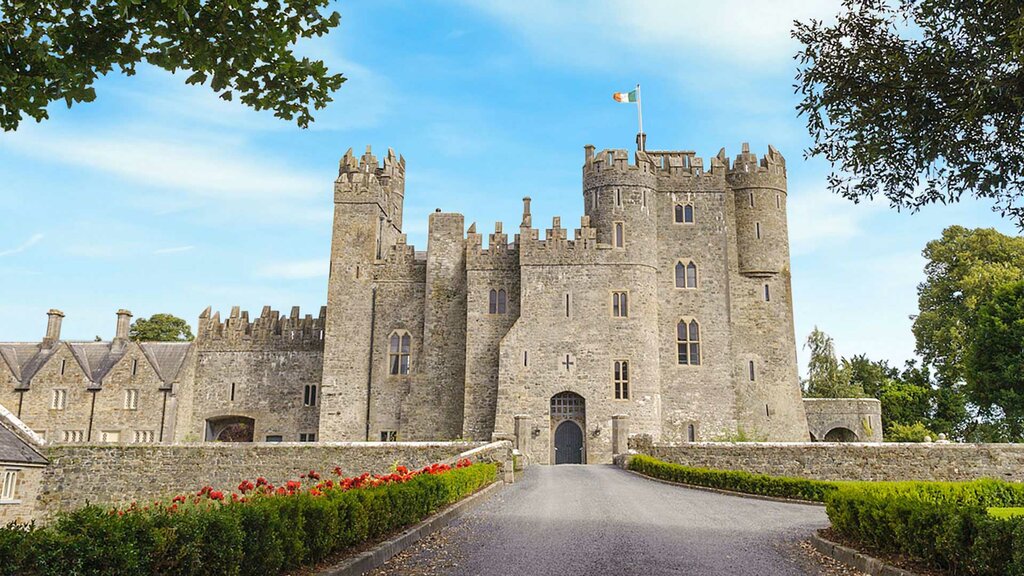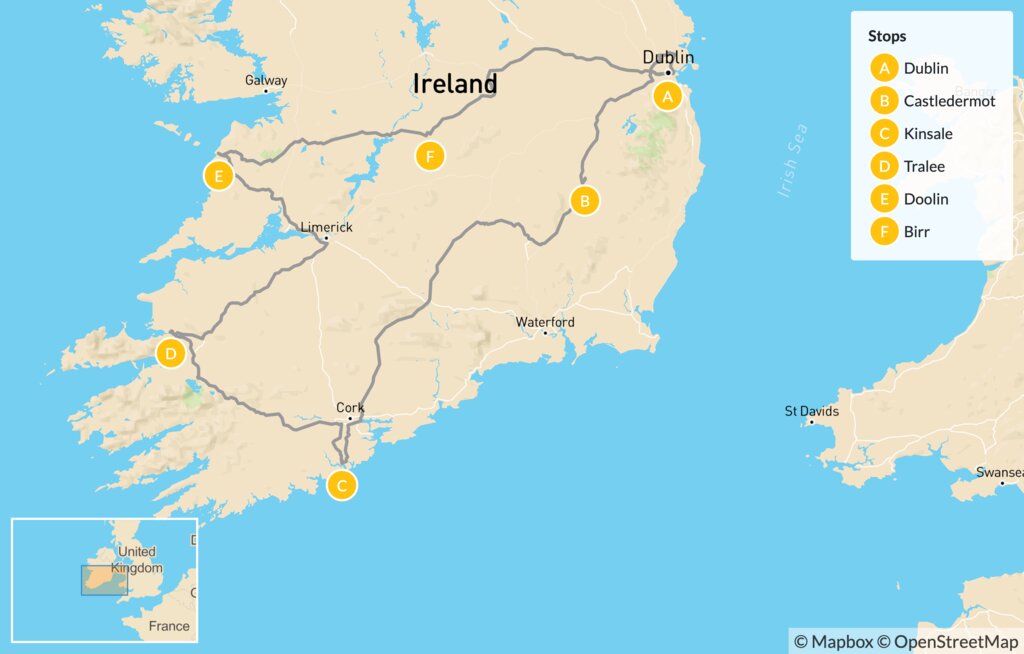Highlights
- Visit epic Irish castles, including "haunted" Leap Castle and Ballyseede Castle
- Try kayaking or stand-up paddleboarding at the sheltered Oysterhaven Beach
- Drive the Ring of Kerry route along the roaring sea and windswept mountains
- Stay at the secluded Ballyseede Castle Hotel, where a warm fire awaits
- Walk across Ireland's longest rope bridge at the Kells Bay coastal estate
Brief Itinerary
| Day | Highlights | Overnight |
|---|---|---|
| Day 1 | Arrive in Dublin, Introduction to Dublin Tour & Kilmainham Gaol | Dublin |
| Day 2 | Visit Kilkea Castle & Falconry | Castledermot |
| Day 3 | Drive to Kinsale, Visit the Rock of Cashel, Blarney Castle & Cork | Kinsale |
| Day 4 | Killarney Lake Boat Trip, Black Valley Walk & Kells House | Tralee |
| Day 5 | Drive the Ring of Kerry, Ballyseede Castle Stay | Tralee |
| Day 6 | Arrive at Doolin Village, Tour a Goat Farm in Clare | Doolin |
| Day 7 | Ferry to the Arran Islands, Hike on Inishmore Island | Doolin |
| Day 8 | Discover the Castles of the Hidden Heartlands, Guided Tour of Leap Castle | Birr |
| Day 9 | Explore Clonmacnoise Monastery & Dublin's Medieval Quarter, Depart |
Detailed Itinerary
Day 1: Arrive in Dublin, Introduction to Dublin Tour & Kilmainham Gaol

Welcome to Ireland! You'll touch down in Dublin, at the mouth of the River Liffey, home to more than a third of the Republic of Ireland's population. Today you'll get to know this lively capital city through the lens of a Dubliner, joining a local historian to weave through the streets on a two-hour walking tour.
Begin on O'Connell Street, a fashionable suburb built in the 1700s and now the city's thoroughfare. Pay a visit to the statue of James Joyce leaning on his walking stick, affectionately known to Dubliners as "the prick with the stick." Make your way through the Temple Bar district, where a bohemian music and arts community guarantees a jubilant atmosphere any time of year. Then, visit Wood Quay, the site of archaeological excavations in the 1970s and '80s that revealed the largest Viking settlement outside Scandinavia.
Later, take a self-guided trip to Kilmainham Gaol, which functioned as a prison between 1796 and 1924. A visit here will take you on a journey through Irish history, as you'll learn the stories of the folk who've dwelled behind its bars—from ordinary criminals to those involved in momentous events. Most of Ireland's political revolutionaries have done time at the Gaol, so you'll get an overview of Ireland's complex political past, from the 1798 Rebellion and the 1916 Easter Rising to the Anglo-Irish War (1919-21) and the Irish Civil War (1922-23).
Day 2: Visit Kilkea Castle & Falconry

After picking up your rental car, your first stop is Kilkea Castle in Castledermot, just over an hour's drive from Dublin. Its stirring history dates back to 1180, making it one of Ireland's oldest continuously inhabited castles. For over 700 years, it was the medieval stronghold of the FitzGerald dynasty (Earls of Kildare), who ruled Ireland on behalf of the kings and queens of England. Those turrets and slit windows transport you back in time, but inside is a different story: its American owners have relaunched it as a five-star hotel.
You'll stay the night here, with 180 acres (73 ha) of private land to explore, including woodland, gardens, and a golf course. Go for the fully immersive experience by getting involved in the "sport of kings," falconry, to witness the majesty of falcons, owls, and hawks against the backdrop of the castle. Other activities include horse riding, shooting, and spa experiences, which your local expert can arrange.
Day 3: Drive to Kinsale, Visit the Rock of Cashel, Blarney Castle & Cork

Today you're southwest-bound to the coastal town of Kinsale, around 2.5 hours from Castledermot. At the halfway point, you'll reach the small town of Cashel, in County Tipperary. Make a stop to stroll around the Rock of Cashel, a medieval ecclesiastical site of Gothic and Romanesque-style buildings. Then, continue to the "Rebel City" of Cork, which has a long history of challenging authority and honoring an independent spirit. Flanking the broad River Lee, you'll find a lively city of grand Georgian avenues and brightly painted alleys.
You can visit Blarney Castle, a 15-minute drive from Cork. The evocative ruins date from the 15th century, where a 10th-century wooden castle once stood. Nature has gloriously taken over, with creeping plants across the inner stone walls and pockets of woodland around the grounds. Its most famous asset is the Blarney Stone: according to Irish legend, kissing the stone imparts the kisser with the "gift of the gab" (meaning, great chat!).
Day 4: Killarney Lake Boat Trip, Black Valley Walk & Kells House

Drive north today, 76 miles (123 km) to Tralee, the capital of County Kerry, which makes a great base to discover the wonders of this western region. Learn about Irish history, customs, and traditions at the excellent County Kerry Museum and the area's rare ecosystems at the Tralee Bay Wetlands Centre. Staying the night also allows you to mingle with locals over pints and hear traditional music at the lively pubs.
Make time to divert to Killarney, a county blessed with a cinematic landscape of mountains, lakes, and forests. Take a relaxing boat trip across the Lakes of Killarney to enjoy panoramas of mountains within the surrounding Killarney National Park. After, drive the winding roads into the remote Black Valley, which gained its name in the 1970s for being the last place on the mainland to be connected to the electric grid.
Chat with a local specialist who can help organize your trip.
Day 5: Drive the Ring of Kerry, Ballyseede Castle Stay

Spend the day sightseeing around the Ring of Kerry, a driving route that circles the Iveragh Peninsula. It's renowned as one of Ireland's most beautiful roads, linking charming settlements like Glenbeigh in the north and Waterville in the west and tracing mountains and sea. Stretch your legs and take the 30-minute trail around Cahergall Stone Fort near Caherciveen, with the Skellig Islands as your backdrop.
When you're suitably worn out, decamp to the regal retreat of Ballyseede Castle. The turreted mansion that stands there today was built in the 18th century on an estate belonging to the Fitzgerald dynasty. While its bloody history has sparked rumors of hauntings, these days, you'll find a four-star hotel with a fire crackling in the reception room and hearty seasonal meals. Before dark, venture into its 30 private acres (12 ha) of peaceful woodland and manicured gardens.
Day 6: Arrive at Doolin Village, Tour a Goat Farm in Clare

Drive north up the coast for almost three hours to reach the lively port village of Doolin, your base for the next couple of nights. For many, it's their favorite village in the west, with an inspiring coastal setting, brightly painted houses, and bands frequently playing in its pubs. It's hailed as the home of traditional Irish music, after all! Bring an appetite, as Doolin is also renowned for its gastronomic delights, especially traditional Irish dishes like stews, veggie soup with soda bread, and potato cakes.
Mother Nature doesn't shy from the dramatic around these parts, and around 4 miles (7 km) south of Doolin, you'll find the mighty Cliffs of Moher. Rising from the raging Atlantic to 700 feet (214 m) at their highest point, standing here is like teetering at the world's edge. You can walk from Doolin to the visitor center and then take the shuttle back, park up at the slightly closer point of Hags Head, or, if you're feeling ambitious, hike the 9-mile (14 km) round-trip along the cliffs. Stop to see Doonagore Castle on the way, a clifftop tower house just south of the village.
Day 7: Ferry to the Arran Islands, Hike on Inishmore Island

Set off from Doolin by boat, and sail past the colossal Cliffs of Moher to reach the Aran Islands. This trio of landmasses, Inis Oírr ("East Island"), Inis Meáin ("Middle Island"), and Inis Mór/Inishmore ("Big Island"), have a history that's both geologically and culturally rich. Their deep Celtic and Christian roots mean the land is dotted with ancient ruins and sacred sites. And with traditions holding strong, the 1,300 people who call the islands home consider Ireland's Gaelic language their native tongue.
If you disembark on Inishmore, you can visit the Arans' most show-stopping sight—the huge iron age fort of Dun Aonghasa, on the edge of a sheer 328-foot (100 m) cliff with the raging Atlantic below. You'll pass it if you pick up the 7-mile (11 km) hiking trail that loops the island's perimeter. There are plenty of pubs to lure you in for a cozy lunch—as you can imagine, fresh seafood such as oysters or crab is a specialty. You can spend the night on the Aran Islands or return to Doolin.
Day 8: Discover the Castles of the Hidden Heartlands, Guided Tour of Leap Castle

It's time to say farewell to the west coast and begin the journey east, but there's still time for one more overnight stop on your way to the capital. Consider exploring the Hidden Heartlands within Ireland's interior for a sense of awe. This remote and unspoiled region feels as far from fast-paced living as possible. Its windswept hills and fairy-tale pools, threaded by empty roads, make it a road trip utopia.
There are castles upon castles to discover as you drive. Wander the halls of the 19th-century Gothic Kinnitty Castle, or walk through the lush forest of Slieve Bloom Way to pass the imposing ruins of Glinsk Castle. Your local expert will arrange a guided tour of Leap Castle in County Offaly, said to be Ireland's most haunted castles thanks to its savage history of battles, murders, and in-fighting among the O'Carrolls of Ely Clan. A member of the Ryan family, the castle's current owners, will tell you the castle's tales and explain their preservation efforts.
If you're traveling with children, Birr Castle and Gardens has a clutch of fun features in its 120 acres (49 ha) of grounds. It's home to Ireland's biggest treehouse and the Great Telescope, a creation by the Third Earl of Rosse in the 1840s that was the world's largest telescope for over 70 years. The castle sits on a river bend in the laid-back heritage town of Birr, which is where you'll spend the night,
Day 9: Explore Clonmacnoise Monastery & Dublin's Medieval Quarter, Depart

On the way to Dublin, stop at Clonmacnoise or Cluain Mhic Nóis in Irish, which means the "Meadow of the Sons of Nós." This sixth-century monastery was founded by St Ciaran and was one of Ireland's most important monastic schools for five centuries. Its scattered ruins of gray stone will transport you to a bygone era.
For one last dose of Irish history, head off on a guided tour of Dublin's Medieval Quarter. This is the oldest part of the city, encompassing the area around Christ Church, St Patrick's Cathedral, and Dublin Castle. The castle was built in the early 13th century on the site of a Viking settlement, and you can still see a relic from this time in the Record Tower, which has 13-foot (4 m) thick walls. Then, it's time to head to Dublin Airport to return your rental car and catch your flight home. Safe travels!
More Great Ireland Itineraries
Looking for more inspiration for your trip to Ireland? Check out these other Ireland itineraries, explore different ways to spend nine days in Ireland, or discover the best time to visit Ireland.


